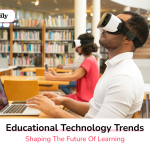Are you curious about the future of education? How can distance learning resources and online education tools revolutionize the way we learn? Discover the power of virtual learning materials that go beyond the confines of traditional classrooms, opening up new possibilities for students everywhere.

Key Takeaways:
- Online learning platforms provide students with convenience and flexibility, allowing them to access course materials at their own pace and according to their own schedule.
- Access to a wide range of courses allows students to explore diverse subjects and gain knowledge beyond traditional education.
- Personalized learning experiences through online platforms use adaptive technologies to cater to individual student needs.
- Contrary to belief, online learning platforms foster engagement and interaction among students through virtual classrooms and multimedia elements.
- Online learning can be a cost-effective alternative to traditional education, offering affordable courses and eliminating expenses associated with physical classes.
Convenience and Flexibility of Online Learning Platforms
Online learning platforms provide students with the convenience and flexibility to pursue their education at their own pace and according to their own schedule. With these platforms, students can access course materials, lectures, and resources from anywhere, anytime, making learning more accessible than ever before.
The Benefits of Flexible Learning
Flexible learning is particularly beneficial for individuals who have busy lives and multiple commitments. Whether it’s balancing work and education or managing family responsibilities, online learning allows students to tailor their education to fit their unique circumstances.
Here are some key advantages of flexible learning:
- Students can choose when and where to study, fitting their education around their existing commitments.
- There is no need to commute to a physical campus, saving time and money.
- Course materials and lectures are accessible 24/7, providing the flexibility to study at any time that suits the student.
- Students can learn at their own pace, spending more time on challenging topics or quickly progressing through areas they find easier.
By offering flexible learning options, online education platforms cater to the diverse needs of students and make education more accessible than ever before.
A Testimonial from a Busy Student
“As a working professional with a family, it was challenging for me to find the time to pursue further education. Online learning not only provided me with the flexibility to study at my own pace but also gave me the freedom to balance my work and personal life. I can access course materials and lectures whenever and wherever it’s convenient for me, allowing me to achieve my educational goals without sacrificing my other commitments.”
With testimonials like these, it’s clear that the convenience and flexibility of online learning platforms are transforming education and empowering individuals to pursue their dreams and goals.
| Advantages of Online Learning |
|---|
| Convenience: Access course materials and lectures anytime, anywhere. |
| Flexibility: Study at your own pace and fit education around existing commitments. |
| Cost-Effective: Save on commuting and other expenses associated with attending physical classes. |
| Personalized Learning: Tailor the learning experience to your unique needs and preferences. |
| Global Networking: Connect with students and professionals from around the world. |
Access to a Wide Range of Courses
Online learning platforms offer students a vast selection of courses in diverse disciplines, granting them access to educational opportunities that may not be readily available in traditional classroom settings. Whether students are interested in pursuing academic subjects or vocational training, these platforms provide a wealth of resources and materials to support their learning journey.
One of the significant advantages of online education is the ability to explore diverse courses that align with individual interests and career goals. Students can broaden their horizons by delving into subjects beyond the confines of traditional education, allowing them to pursue their passions and gain knowledge in specialized areas.
Marie, a high school student from a rural town, dreamt of studying marine biology but lacked access to relevant courses in her local school. Through an online learning platform, she was able to enroll in a comprehensive marine biology course that provided in-depth knowledge, interactive lessons, and virtual experiments. This opportunity not only fueled her passion but also opened doors to future career prospects in marine conservation.
Vocational training is another area where online learning platforms excel. Whether it’s learning a new language, developing coding skills, or acquiring practical expertise in trades such as carpentry or plumbing, these platforms offer a wide array of vocational courses to cater to various skill sets and interests. The flexibility and accessibility of online resources make it easier for individuals to embark on a path of vocational learning and enhance their employability.
Furthermore, online learning platforms often collaborate with prestigious institutions and industry professionals to curate courses that meet the demands of the current job market. This ensures that students have access to up-to-date and relevant content, equipping them with the skills and knowledge required to succeed in their desired fields.
Benefits of Accessible Diverse Courses:
- Opportunity to pursue individual interests and passions
- Access to vocational training for skill development
- Collaboration with prestigious institutions and industry professionals
- Enhanced employability in diverse fields
Online learning platforms empower students to tailor their education to suit their unique interests and career aspirations. By providing access to diverse courses, these platforms foster a love for learning, ignite curiosity, and prepare individuals for success in an ever-evolving world.
| Benefits of Access to Diverse Courses | Traditional Education | Online Learning |
|---|---|---|
| Flexibility to pursue specialized interests | Restricted by limited course offerings | Wide range of courses available |
| Access to vocational training | Dependent on availability of vocational programs | Abundance of vocational courses |
| Collaboration with industry professionals | Limited exposure to real-world professionals | Opportunities for networking and mentorship |
| Preparation for diverse career paths | Constrained by traditional curriculum | Customizable learning paths |
Personalized Learning Experience
One of the key benefits of online learning platforms is the ability to provide personalized learning experiences to students. Through the integration of adaptive learning technologies, these platforms can cater to individual student needs, ensuring that they receive targeted instruction and support.
Adaptive learning technologies utilize algorithms to assess students’ progress and adapt the learning materials accordingly. By analyzing students’ strengths and weaknesses, these technologies can personalize the learning journey, allowing students to focus on areas where they need improvement.
This personalized approach to learning not only promotes a deeper understanding of the subject matter but also enhances student engagement and motivation. When students receive personalized feedback and recommendations, they can track their progress, set goals, and take ownership of their learning.
Benefits of Personalized Learning:
- Targeted Instruction: Adaptive learning technologies enable students to receive individualized instruction that caters to their unique learning styles and needs.
- Self-Paced Learning: With online education tools, students can learn at their own pace, allowing for a more flexible and personalized learning experience.
- Improved Motivation: Personalized feedback and recommendations help students stay motivated and engaged throughout their learning journey.
- Greater Mastery: By focusing on their specific areas of improvement, students can achieve a deeper level of understanding and mastery of the subject matter.
Through personalized learning experiences, online learning platforms empower students to take control of their education, adapt to their learning preferences, and excel in their academic pursuits.
Enhanced Interactivity and Engagement
Contrary to popular belief, online learning platforms have the potential to foster a sense of community and engagement among students. Through various digital tools and features, these platforms create an interactive and collaborative learning environment that goes beyond the limitations of traditional classrooms.
In virtual classrooms, students can connect with peers from around the world, expanding their global network and exposing themselves to diverse perspectives. Discussion boards provide a space for thoughtful exchanges and debates where students can actively participate in academic conversations.
To make the learning experience more dynamic and engaging, online education tools incorporate multimedia elements. Videos, for example, deliver content in an engaging and visual format, enhancing understanding and retention. Interactive quizzes and gamification techniques add an element of fun and competition, motivating students to actively participate and test their knowledge.
By combining these multimedia elements with interactive features, online learning platforms create an immersive learning environment where students can explore complex concepts, work on real-world scenarios, and actively engage with course materials.
Cost-Effectiveness of Online Learning
Traditional education often comes with a hefty price tag, including tuition fees, textbooks, and commuting expenses. However, online learning platforms offer a cost-effective alternative, making education more affordable and accessible to a wider audience. Whether you’re looking to acquire new skills or pursue higher education, online learning provides a cost-effective pathway to achieve your goals.
By opting for online courses, students can save money on transportation, accommodation, and other expenses associated with attending physical classes. Additionally, many online courses are more affordable or even free compared to their traditional counterparts, making education a more attainable goal for individuals looking for a cost-effective alternative.
Furthermore, online learning eliminates the need to purchase expensive textbooks. Instead, course materials are often provided digitally, reducing the financial burden on students. This not only saves money but also allows for easier access and portability of learning resources.
Let’s take a closer look at the cost-effectiveness of online learning compared to traditional education:
| Expenses | Traditional Education | Online Learning |
|---|---|---|
| Tuition Fees | Higher tuition fees at colleges and universities. | Lower tuition fees or even free courses available. |
| Textbooks | Expensive textbooks required for each course. | Most course materials are provided digitally, reducing textbook expenses. |
| Commute | Costs associated with transportation to and from campus. | No commuting expenses, as learning can be done from anywhere. |
| Accommodation | Expenses for student housing or living near campus. | No need for accommodation near campus, reducing living expenses. |
As you can see, online learning offers a more cost-effective alternative, allowing individuals to pursue education without the financial burden often associated with traditional education. By minimizing expenses related to tuition, textbooks, commute, and accommodation, online learning provides a viable option for those looking for affordable education.
Unlocking the benefits of online learning not only saves you money but also provides the opportunity to learn at your own pace, access a wide range of courses, and gain skills that are relevant to the constantly evolving job market. Embrace the cost-effective alternative and explore the world of online learning resources and tools available at your fingertips.
Testimonials
“Online learning has been a game-changer for me. Not only is it more affordable, but it also allows me to balance my education with my work and family responsibilities. The cost-effectiveness of online learning has made it possible for me to pursue my dreams without sacrificing my financial stability.”
Emma Thompson
“I’ve saved so much money by opting for online courses. The tuition fees are significantly lower, and I don’t have to worry about additional expenses like textbooks or commuting. Online learning has made education more accessible and affordable, and I’m grateful for the cost-effective alternative it provides.”
David Johnson
Continuous Learning and Skill Development
Online learning platforms provide a wealth of opportunities for individuals to engage in continuous learning and skill development beyond traditional degree programs. With access to a wide range of distance learning resources and online education tools, students can enhance their employability, pursue career transitions, or explore new areas of interest through short courses and skill development programs.
These platforms offer a diverse selection of short courses, certifications, and specialized programs that cater to various industries and professions. Whether you’re looking to upgrade your skills, acquire new knowledge, or stay updated with the latest industry trends, online learning platforms can provide the resources you need.
Benefits of Short Courses and Skill Development Programs
Short courses and skill development programs offered through online learning platforms offer several advantages:
- Flexible Learning: Online courses allow you to learn at your own pace and manage your schedule effectively. You can access course materials and lectures whenever and wherever it’s convenient for you, making it easier to balance your learning with other commitments.
- Focused Learning: Short courses and skill development programs enable you to focus on specific areas of interest or acquire targeted skills that are highly relevant to your career goals. This level of specialization can lead to quicker career advancement and increased job opportunities.
- Practical Application: Many online courses emphasize practical learning and provide hands-on exercises, real-world projects, and case studies that allow you to apply your knowledge and skills in a practical setting.
- Expert Instruction: Online courses are often taught by industry experts who bring extensive experience and knowledge to the learning process. You will have the opportunity to learn from the best in the field and gain valuable insights.
- Networking: Online learning platforms also provide opportunities for networking and collaboration with fellow learners and industry professionals. Discussion forums, online communities, and virtual networking events allow you to connect, share ideas, and build relationships with others in your field.
Incorporating short courses and skill development programs into your education journey can significantly enhance your professional growth and make you more competitive in today’s job market.
Global Opportunities Networking
Online learning platforms offer students the chance to connect with a diverse community of learners and industry professionals from around the world. Through virtual networking events, forums, and social media groups, students can expand their professional network and gain valuable insights from experts in their chosen field. This global networking not only facilitates collaboration and knowledge sharing but also opens doors to exciting career opportunities.
“Networking is an essential aspect of professional growth. Online learning platforms provide students with the unique opportunity to build connections and expand their network on a global scale.”
– Jane Smith, Industry Expert
Benefits of Global Networking
- Collaboration: By engaging with learners and professionals from different backgrounds and regions, students can collaborate on projects, share ideas, and gain fresh perspectives.
- Knowledge Sharing: Through conversations and discussions, students can tap into the collective knowledge of a global community, expanding their understanding of various subjects and industries.
- Career Opportunities: Virtual networking events often bring together recruiters, industry leaders, and potential employers. Students can leverage these connections to explore job opportunities and internships across the globe.
- Mentorship: Global networking provides access to experienced professionals who can offer guidance and mentorship to students, helping them navigate their careers and make informed decisions.
By actively participating in online communities and attending virtual networking events, students can harness the power of global networking to enhance their educational journey and propel their professional growth.
| Networking Platform | Features |
|---|---|
|
|
| Virtual Events Platforms |
|
| Online Discussion Forums |
|
Make the most of these online networking platforms and resources to foster meaningful connections, gain industry insights, and unlock a world of opportunities.
Balancing Technology and Traditional Teaching Methods
The integration of technology with traditional teaching methods is a critical aspect of modern education. It allows for the enhancement of traditional teaching approaches by incorporating interactive and immersive learning experiences that technology can provide. By striking the right balance between technology and traditional methods, educators can take advantage of the benefits offered by both approaches simultaneously.
Technology integration in the classroom opens up a world of possibilities. Online education tools and distance learning resources enable educators to create engaging and interactive lessons, making learning more accessible and enjoyable for students. At the same time, traditional teaching methods provide a solid foundation and structure that help foster critical thinking and problem-solving skills.
“The combination of technology and traditional teaching methods has the potential to revolutionize education. It allows us to harness the power of digital tools while maintaining the human touch and personalized approach of face-to-face instruction.”
– Dr. Sarah Johnson, Education Specialist
Integrating technology in education goes beyond using devices and software. It involves reimagining lesson plans, incorporating multimedia elements, and leveraging online platforms to create collaborative learning environments. The use of technology can foster creativity, communication, and collaboration among students.
Harnessing the Power of Online Education Tools
Online education tools provide a wealth of resources and opportunities for educators to enhance their teaching methods. These tools can be used to create interactive presentations, facilitate online discussions, and assess student progress. They offer flexibility and access to a wide range of educational materials, enabling educators to tailor their lessons to meet the needs and interests of individual learners.
Technology integration also plays a crucial role in cultivating digital literacy skills, which are fundamental in today’s digital age. By incorporating online education tools, educators ensure that students develop the necessary skills to navigate and thrive in a technology-driven world.
Embracing the Best of Both Worlds
The key to effectively balancing technology and traditional teaching methods is to leverage the strengths of each approach. Technology can provide engaging and interactive learning experiences, while traditional methods offer structure, critical thinking, and human connection.
By combining traditional teaching methods with technology integration, educators can create holistic learning environments that cater to the diverse needs and learning styles of their students. This approach ensures that students are equipped with the necessary skills and knowledge to thrive in the digital age while fostering a love for lifelong learning.
Meeting the Challenges of the Digital Divide
The digital divide refers to the disparity between individuals who have access to modern information and communication technology and those who do not. This divide can create significant inequalities in education, hindering the opportunities for learning and skill development.
To address this challenge, it is critical to focus on providing equitable access to technology, ensuring that all students have the resources they need to thrive in an increasingly digital world. This involves implementing policies that bridge the gap and promote inclusivity in education.
Investing in teacher training is another crucial aspect of meeting the challenges of the digital divide. Educators need the necessary knowledge and skills to effectively incorporate distance learning resources and online education tools into their teaching practices. By empowering teachers with the right tools and training, we can ensure that students receive a quality education, regardless of their access to technology.
Additionally, developing curricula that blend the best of both technology and traditional teaching methods is essential. This approach enables students to benefit from the advantages of online education tools while also fostering critical thinking, problem-solving skills, and human interaction. By striking a balance between technology and traditional teaching methods, we can create a more inclusive learning environment that caters to the diverse needs of students.
Benefits of Addressing the Digital Divide
By addressing the digital divide and promoting equitable access to technology, we can unlock a myriad of benefits for students and society as a whole.
- Equal opportunities for learning and skill development
- Enhanced educational outcomes and academic success
- Increased workforce readiness and employability
- Reduced socioeconomic inequalities
- Promotion of innovation and digital literacy

Equitable access to technology is crucial in ensuring that all students have the opportunity to succeed in a digital world.
| Challenges of the Digital Divide | Strategies to Address the Challenges |
|---|---|
| Lack of access to technology | Invest in infrastructure development and provide devices to students |
| Limited internet connectivity | Expand broadband access in underserved areas and promote community initiatives |
| Unequal digital skills | Offer digital literacy programs and training for students, parents, and educators |
| Financial barriers | Implement policies for affordable technology and internet access |
“Bridging the digital divide is not just about providing access to technology, but also empowering individuals to utilize that technology effectively for education and personal development.” – Bill Gates
Fostering Engagement and Lifelong Learning
Integrating technology into education has the potential to revolutionize student engagement and foster lifelong learning. By leveraging distance learning resources and online education tools, educators can create interactive and immersive learning experiences that capture students’ interest and inspire them to continue learning beyond the classroom.
Online platforms provide the perfect platform to engage students through a variety of multimedia elements such as videos, virtual reality, and gamification techniques. These tools not only make learning more enjoyable but also enhance students’ understanding and retention of the material.
Interactive Learning Experiences
One of the key advantages of online education tools is their ability to offer interactive learning experiences. Activities such as virtual laboratories, simulations, and interactive quizzes allow students to apply their knowledge in a practical and engaging way. This hands-on approach promotes active learning and deepens students’ understanding of the subject matter.
Moreover, the integration of discussion boards and collaborative projects within online learning platforms encourages students to actively participate and engage with their peers. These collaborative activities facilitate knowledge sharing and foster a sense of community among learners, even in remote environments.
Lifelong Learning Opportunities
By embracing online education tools, students are empowered to become lifelong learners. These resources provide students with the flexibility to pursue education at their own pace and explore topics of personal interest. For professionals seeking to upskill or change careers, online platforms offer a convenient way to acquire new skills and stay relevant in a rapidly evolving job market.
Additionally, online learning can foster a growth mindset, encouraging individuals to continuously seek new knowledge and embrace intellectual curiosity. With the vast array of courses and resources available online, learners have the opportunity to expand their horizons and gain a comprehensive understanding of various subjects.
“The passion for lifelong learning is one of the greatest gifts you can give yourself.”
– Sarah Caldwell
Preparing for the Digital Age
Incorporating technology into education equips students with essential skills for the digital age. As the world becomes increasingly interconnected and reliant on technology, it is crucial for students to develop a strong foundation in digital literacy and critical thinking.
Online education tools introduce students to various digital platforms and tools, preparing them for the evolving technological landscape. From basic computer skills to coding and data analysis, these resources empower students with the knowledge and expertise needed to thrive in a technology-driven society.
Real-World Applications and Case Studies
| Case Study | Online Education Tool | Lifelong Learning Topic |
|---|---|---|
| 1 | edX | Data Science |
| 2 | Coursera | Entrepreneurship |
| 3 | Khan Academy | Mathematics |
Table: Real-world applications and case studies of online education tools for lifelong learning.
By leveraging distance learning resources and online education tools, educators can engage students and inspire a lifelong love for learning. The integration of technology not only enhances student engagement but also equips them with the skills necessary to thrive in the digital age.
Conclusion
The future of education lies in the seamless integration of technology with traditional teaching methods. By harnessing the power of online education tools and distance learning resources, we can create robust learning environments that benefit both students and educators.
One key aspect of this integration is ensuring equal access to technology for all students. By promoting digital equity, we can bridge the gap between those who have access to technology and those who don’t, enabling a level playing field for education. Furthermore, investing in teacher training is crucial to equip educators with the skills and knowledge needed to effectively incorporate technology into their teaching practices.
Advocating for policies that support the thoughtful integration of technology in education is another crucial step. By creating a conducive environment for technology integration, we can foster innovation and creativity in classrooms, preparing students for the challenges of the 21st century. Together, we can shape an education system that is diverse, inclusive, and equipped to meet the ever-evolving needs of learners in the digital age.


